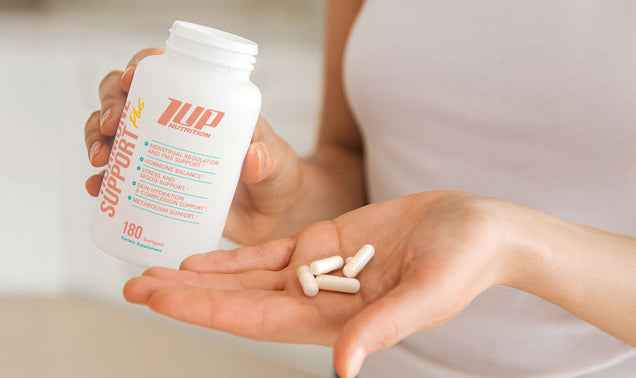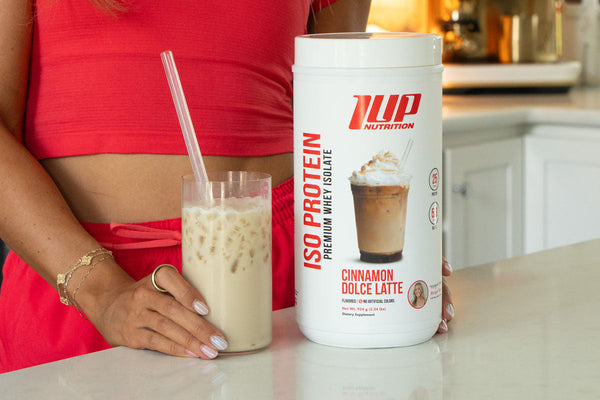Whether you’re aiming to build muscle, shed body fat, maintain your transformation challenge results, or simply live a healthy, active lifestyle, one macronutrient stands above the rest: protein.
In this article, we’ll explore the significant role of protein in weight management and muscle growth, as well as how you can easily work it into your daily diet.
What Is Protein and Why Is It Important?
Proteins are macromolecules composed of amino acids -- the building blocks of our body. Our bodies use 20 amino acids (including 9 essential amino acids, EAAs) to create thousands of different proteins that affect numerous physiological functions, including:
- Muscle growth
- Tissue repair
- Immune function
- Hormone synthesis
- Neurotransmitter production
- Digestion
In terms of management and muscle growth, protein’s powers reside in its ability to boost metabolism, increase satiety, boost protein synthesis and combat muscle breakdown. Now, let’s dive a little deeper into the numerous benefits of protein, beginning with…
Protein and Weight Management
Protein is most often associated with its muscle building benefits, but it plays an equally important role in shedding body fat:
Increased Satiety and Appetite Control:
Ever notice how you feel full after eating a big steak, or how hungry you feel after eating a whole bag of chips?
You’ve experienced, first hand, the satiety powers of protein.
In fact, protein is the most satiating macronutrient. This means that building your meals around a base of protein and rounding it out with complex carbs (fruits, veggies, whole grains, etc.) and healthy fats (avocado, olive oil, etc.) can help you to feel fuller after eating, and thus less likely to snack between meals or overeat by day’s end.
Research notes that high-protein meals stimulate the release of certain satiety hormones, including glucagon-like peptide- 1 (GLP-1), cholecystokinin (CCK), and peptide tyrosine-tyrosine (PYY), while also suppressing ghrelin (a hunger hormone).[1]
Thermic Effect of Food (TEF):
The thermic effect of food refers to the energy your body expends to digest, absorb, and metabolize food. Protein, including whey protein and clear protein, has a greater thermic effect than either carbs or fat.[2] This means that if you have two meals of similar calorie contents, the one with the higher protein content would require more energy to digest and utilize.
Basically, consuming protein-rich foods can slightly increase your daily energy expenditure, which supports both weight loss and weight management.
Preserving Lean Muscle Mass during Weight Loss:
When a person says they want to lose weight, what they really mean is that they want to lose fat.
However, when you place your body in a calorie deficit it can lose both fat and muscle. That is, unless you do two very important things.
- Perform resistance training 2-4x per week
- Consume enough daily protein (~1-1.2 grams per pound)
Resistance training and adequate protein intake send a powerful signal to your body that it needs the muscle it has. So instead of breaking down your hard-earned lean muscle for energy, it will turn to elsewhere -- body fat.
Protein and Muscle Growth
Muscle growth (hypertrophy) occurs when muscle protein synthesis (MPS) exceeds muscle protein breakdown (MPB). Adequate protein intake is a critical component to building muscle and seeing results from your hard work.
Muscle Protein Synthesis (MPS):
Muscle protein synthesis is the process by which the body builds new muscle proteins to repair and grow muscle tissue. Resistance training ignites muscle protein synthesis, but to sustain it, you must consume enough high-quality protein during the day, since protein provides the building blocks your muscles need for repair and growth.
Emphasis is usually placed on consuming enough protein immediately after training (the post-workout shake). While that is important, it’s much more important to consume enough protein throughout the day. Ideally, you would consume ~1 gram per pound of body weight.
So, if you weigh 135 pounds, you would consume 135 grams of protein per day. This amount would be split evenly across your meals and snacks.
Combats Muscle Breakdown:
Protein synthesis and protein breakdown are daily processes for our body. Intense physical exercise (e.g. resistance training) creates microtears in muscle fibers and breaks down muscle proteins.
Not only does eating protein help stimulate protein synthesis (anabolism), it also helps stop protein breakdown (catabolism).
Over many weeks, months, and years of hard training and proper eating, protein synthesis exceeds protein breakdown, which ultimately supports muscle growth!
Protein Quality Matters:
Not all protein sources are the same nor are they of the same quality.
Complete proteins are the best protein sources. These contain all nine essential amino acids (EAAs) our bodies require to stimulate muscle protein synthesis. Incomplete proteins, therefore, are protein sources that are lacking/deficient in one (or more) of the EAAs., are especially beneficial for muscle growth.
Examples of complete proteins are animal-based sources like red meat, fish, shellfish, poultry, wild game, eggs, dairy, and whey protein powder.
Examples of incomplete proteins are plant-based sources like rice, whole grains, beans, and nuts. You can form a complete protein by combining two complementary plant proteins, such as rice and beans; however, research has shown that animal proteins tend to offer greater bioavailability than plant proteins.[3]
How to Include Protein in Your Daily Nutrition Plan
Looking to boost your protein intake and reap the benefits of protein for weight management and muscle growth?
Here are a few tips:
-
Start your day with protein: Breakfast has long been associated with lots of carbs (biscuits, pancakes, toast, muffins, doughnuts, etc.), but to give your mind and muscles what it needs to start the day right, start with protein! If you’re not a big breakfast person, something as simple as a scoop or two of protein powder with milk or water is a great option!
-
Make protein the base of every meal: By focusing on protein at each meal, you help support the muscle recovery/growth process as well as keep your hunger/appetite cues in check
- Prioritize post-workout nutrition: After a hard workout, consume a protein-rich snack or meal to halt muscle breakdown and fuel muscle recovery. Even something as simple as a protein shake or cup of Greek yogurt with berries helps flood the body with amino acids, decrease cortisol, and kickstart muscle repair.
Conclusion
Protein is essential for both weight management and muscle growth. By increasing satiety, boosting metabolism, and preserving lean muscle mass, protein helps you maintain a healthy weight.
For muscle growth, protein stimulates muscle protein synthesis and prevents muscle breakdown.
Make sure to emphasize complete protein sources in your diet, like lean meats, fish, shellfish, eggs, and dairy. This also includes protein powders like whey protein, clear protein and select vegan protein powders -- 1UP Vegan Protein is specially formulated using pea protein -- a complete plant protein that’s been shown to be comparable to whey.[4,5]
The 1UP Difference
We realize you have a lot of choices when it comes to purchasing a protein powder (or other dietary supplements), but just as not all protein sources are the same, neither are all sports nutrition companies.
We go to great lengths and spare no expense to bring you the best supplements possible.
1UP Nutrition supplements are lab tested for Heavy Metals, Microbiological, and Label Accuracy in a NSF/ANSI GMP 455-2 Certified, FDA Registered and inspected facility.
Grab a tub of your favorite protein powder today, and experience the 1UP Difference!
References
- Moon J, Koh G. Clinical Evidence and Mechanisms of High-Protein Diet-Induced Weight Loss. J Obes Metab Syndr. 2020 Sep 30;29(3):166-173. doi: 10.7570/jomes20028. PMID: 32699189; PMCID: PMC7539343.
- Halton TL, Hu FB. The effects of high protein diets on thermogenesis, satiety and weight loss: a critical review. J Am Coll Nutr. 2004 Oct;23(5):373-85. doi: 10.1080/07315724.2004.10719381. PMID: 15466943.
- Hoffman JR, Falvo MJ. Protein - Which is Best? J Sports Sci Med. 2004 Sep 1;3(3):118-30. PMID: 24482589; PMCID: PMC3905294.
- Banaszek A, Townsend JR, Bender D, Vantrease WC, Marshall AC, Johnson KD. The Effects of Whey vs. Pea Protein on Physical Adaptations Following 8-Weeks of High-Intensity Functional Training (HIFT): A Pilot Study. Sports (Basel). 2019 Jan 4;7(1):12. doi: 10.3390/sports7010012. PMID: 30621129; PMCID: PMC6358922.
- Babault N, Païzis C, Deley G, Guérin-Deremaux L, Saniez MH, Lefranc-Millot C, Allaert FA. Pea proteins oral supplementation promotes muscle thickness gains during resistance training: a double-blind, randomized, Placebo-controlled clinical trial vs. Whey protein. J Int Soc Sports Nutr. 2015 Jan 21;12(1):3. doi: 10.1186/s12970-014-0064-5. PMID: 25628520; PMCID: PMC4307635.






